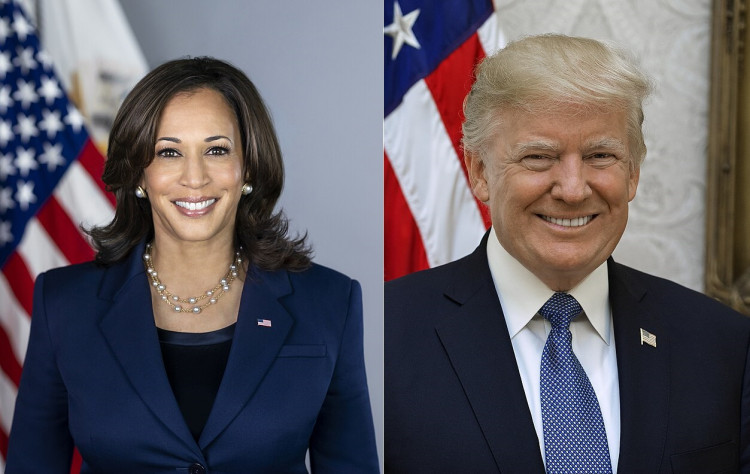Former President Donald Trump has once again found himself in the spotlight after making an unexpected accusation against Vice President Kamala Harris. Speaking at a recent event, Trump, 78, suggested that Harris had deliberately set him up with an uncomfortable chair in an attempt to make him fall in front of the audience. "This chair is the most uncomfortable chair. It spins, and the one thing I don't want is to fall on my a--. I'm not sitting in that sucker. I think it's a b---- trap that was put there by Kamala," Trump quipped to the crowd, prompting an immediate wave of reactions on social media.
The comment raised eyebrows and left many questioning the former president's latest remarks about his political opponent. Social media users quickly seized upon the odd accusation. One user on X, formerly known as Twitter, remarked, "He is actually a cartoon character," while another added, "She's living rent-free in his head." The incident has become just the latest in a string of peculiar comments from Trump, who seems to be increasingly fixated on Harris as the 2024 election draws closer.
This isn't the first time Trump has singled out Harris in his speeches. Over the past few months, he has made several offbeat claims about her background, including a repeated allegation that she fabricated details about her work history. During a recent rally, Trump claimed Harris had falsely stated she worked at a McDonald's as a teenager. "She said, 'I worked at McDonald's. It was a tough job.' She said she worked over the French fries... It turned out to be a lie. It's all a big lie. She's not qualified to be the president," Trump told supporters. Despite no evidence to back up his claims, Trump continues to challenge Harris's qualifications, referring to her as "mentally impaired" in a speech last month.
As the 2024 presidential election looms, with both Trump and Harris vying for the highest office, the race has intensified. Polls show the two candidates in a tight contest, with battleground states becoming crucial to determining the outcome. According to David Greenberg, a presidential historian at Rutgers University, "In any super close race, where the electorate is divided down the middle, a difference of a percentage point or two could be decisive." Greenberg emphasized that both parties are looking for an edge in these final weeks of the campaign, but unexpected events - or even odd public remarks - could shift the momentum.
One such potential disruption occurred when Hurricane Helene tore through the southeastern United States, hitting key battlegrounds like Georgia and North Carolina. The hurricane, which has claimed over 130 lives, has put the candidates' disaster response efforts under intense scrutiny. While Harris has pledged long-term aid for the storm's victims, Trump has accused the Biden-Harris administration of diverting disaster relief funds for other purposes, particularly for supporting migrants. "They're stealing the FEMA money just like they stole it from a bank," Trump declared during a recent visit to Georgia, despite the fact that the funds for disaster relief and migrant support come from separate federal programs.
The Trump-Harris matchup has also been complicated by foreign affairs, particularly the ongoing Gaza conflict. With tensions escalating in the Middle East, Harris's continued support for U.S. military aid to Israel has alienated certain segments of the Democratic base, particularly young voters and Arab-Americans. These voters could prove pivotal in swing states like Michigan, where the growing unease about the administration's foreign policy might influence voter turnout. "This is a difficult situation for Harris," Greenberg explained. "While foreign policy isn't always the top concern for voters, it can create significant ripples in key states."
Despite the heated political environment, Harris received some positive news as the latest employment figures showed strong job growth, and unemployment dropped to 4.1%. While Trump has maintained an edge in polling on economic issues, recent surveys suggest that this lead may be narrowing. The Cook Political Report, for example, indicated that voters in swing states are now equally divided on who they believe would better handle inflation.
However, a major issue that continues to hang over Trump's campaign is the fallout from the January 6 Capitol riot. A federal judge recently unsealed documents from special counsel Jack Smith's investigation into Trump's role in the events of that day, shining a renewed spotlight on the former president's conduct. According to a CNN poll, voters prefer Harris over Trump on issues of "protecting democracy" by a margin of 47% to 40%, a gap that could widen as more details about the Capitol riot investigation come to light.
As the election race enters its final stretch, both candidates are walking a tightrope, with even small shifts in public opinion potentially determining the outcome. With accusations, policy debates, and personal attacks dominating the news cycle, November's election is shaping up to be one of the closest and most contentious in recent memory.
Greenberg summed it up: "This election could go either way, and the consequences are enormous for both the nation and the world."






